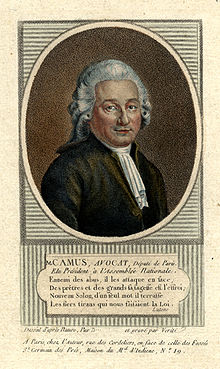Armand Gaston Camus
Armand Gaston Camus (born April 2, 1740 in Paris , † November 2, 1804 there ) was a French politician during the French Revolution , publicist and national archivist.
Life
He studied law . He later became a recognized specialist in canon law . He represented the clergy as a lawyer at the Parlement of Paris. He was also the councilor of the Elector of Trier and the Prince of Salm-Salm . Because he campaigned for a reform of the court, he had to resign. Camus then pursued literary and historical studies and translated Aristotle's natural history of animals into French. From 1785 he was a member of the Académie des Inscriptions et Belles-Lettres .
He was elected to the Estates General of 1789 as a representative of the Third Estate in Paris. In the early days of the meeting he was one of the leading figures of the Third Estate. As secretary of the assembly, he collected the signatures of the MPs for the Ballhaus oath and was one of the first to swear not to part until a constitution was drawn up. In 1790 the National Assembly appointed him archivist of the National Archives .
As a national archivist, he collected numerous documents on the activities of the National Assembly. Because a law of 1794 stipulated access to the archive, he had to build it up according to new principles with regard to usability.
In parliament, Camus made a name for himself primarily as a speaker against the clergy and nobility. He criticized the social differences and pleaded for the emigrants' property to be sold. In particular, he campaigned for the civil constitution of the clergy . Last but not least, he took possession of papal possessions in southern France. He himself was a deeply religious believer and a follower of Jansenism . He was President of the National Assembly in October / November.
Later Camus was a member of the National Convention and represented the Upper Loire. In 1792 he was sent to Belgium to observe General Dumouriez . A year later he charged the general and was taken prisoner along with other emissaries from Dumouriez on another trip to arrest the general and extradited to the Austrians.
As a prisoner, he translated ancient texts. After being imprisoned for thirty months, he and other French men were taken prisoner in Austria against Marie Thérèse Charlotte de Bourbon , a daughter of Louis XVI. , exchanged. After his release he was a member of the Council of Five Hundred and was also temporarily president of the congregation. On various occasions he was offered the office of finance or police minister, which he always refused.
He turned in vain against Napoleon's unrestricted claim to power as the first consul. In 1800 he was commissioned to collect old chronicles in the province. He published the results in two volumes in 1803.
Individual evidence
- ^ Francois Furet, Denis Richet: The French Revolution. Frankfurt am Main 1981, p. 92.
- ↑ Michel Espagne: Archive and Interculturality, in: Ders. u. a. (Ed.): Archive and memory. Studies on intercultural transmission. Leipzig, 2000 p. 334.
- ↑ See Wolfgang Hans Stein: The mission of the French archive and library commissioners Armand-Gaston Camus and Jean-Baptiste Maugérard in the Rhenish departments 1802–1804, in: Yearbook for West German State History 41 (2015), pp. 241–260.
literature
- State and society lexicon. Vol. 5 , Berlin 1861 p. 14.
Web links
| personal data | |
|---|---|
| SURNAME | Camus, Armand Gaston |
| BRIEF DESCRIPTION | French politician |
| DATE OF BIRTH | April 2, 1740 |
| PLACE OF BIRTH | Paris |
| DATE OF DEATH | November 2, 1804 |
| Place of death | Paris |

